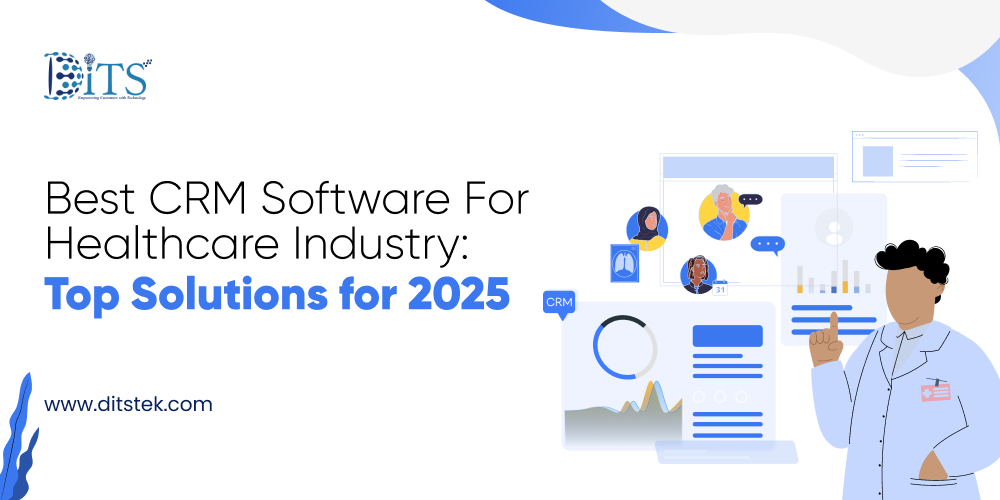In the healthcare industry, building and maintaining strong relationships is just as important as delivering quality medical services. Whether it’s hospitals, private practices, or healthcare networks, providers must manage vast amounts of patient information, schedule appointments, follow up on care, and comply with strict regulatory requirements—all while offering a personalized patient experience.
This is where Customer Relationship Management (CRM) software becomes invaluable. The best CRM software for the healthcare industry not only improves patient engagement and satisfaction but also streamlines internal processes, enhances communication, and ensures data compliance.
In this article, we explore the key features of healthcare-specific CRMs, their benefits, and a shortlist of the best CRM solutions for healthcare providers.
Why Healthcare Needs a Specialized CRM
Unlike standard business CRMs, a healthcare CRM must address unique challenges:
-
Patient Confidentiality: Must comply with regulations such as HIPAA (U.S.), GDPR (EU), or local privacy laws.
-
Complex Scheduling Needs: Healthcare organizations often deal with recurring appointments, cancellations, and multi-specialist coordination.
-
Multi-Channel Communication: Communication must be secure and span across email, SMS, calls, and portals.
-
Data Integration: Needs to work alongside EMRs (Electronic Medical Records), billing systems, and lab software.
-
Patient Lifecycle Management: From first contact to post-treatment follow-up, the CRM must track and support the full patient journey.
Top Features of the Best Healthcare CRMs
To serve the healthcare sector effectively, CRM software should include:
-
HIPAA-Compliant Data Security
-
Automated Appointment Scheduling and Reminders
-
Patient Segmentation and Targeted Campaigns
-
Follow-Up and Treatment Reminders
-
Referral Tracking
-
Analytics and Reporting on Patient Engagement
-
Integration with EHR/EMR and Practice Management Systems
Best CRM Software for the Healthcare Industry
Below are some of the leading CRM solutions tailored or adaptable to the healthcare sector:
1. Salesforce Health Cloud
Best for: Large healthcare networks and organizations needing deep customization
Salesforce Health Cloud is a powerful, enterprise-grade CRM tailored for patient relationship management. It allows healthcare providers to view complete patient profiles, track care plans, and collaborate across departments securely.
Key Features:
-
Patient timeline and risk stratification
-
HIPAA-compliant data management
-
Integration with EHRs and clinical systems
-
AI-driven care coordination and predictive analytics
2. Zoho CRM for Healthcare
Best for: Small to medium healthcare practices
Zoho CRM is flexible and cost-effective, with customizable modules for patient and lead tracking. While not a dedicated healthcare CRM, it can be tailored through integrations and add-ons.
Key Features:
-
Patient data tracking and segmentation
-
Automated follow-ups and reminders
-
Integration with telemedicine and scheduling apps
-
HIPAA compliance via Zoho’s enterprise edition
3. NexHealth
Best for: Dental, dermatology, and outpatient clinics
NexHealth offers a healthcare-specific CRM platform with a focus on patient retention, appointment management, and digital communication.
Key Features:
-
2-way messaging with patients
-
Online scheduling and automated reminders
-
Integration with over 100 EHR systems
-
Contactless forms and patient reviews
4. Kareo
Best for: Independent medical practices
Kareo is primarily a medical practice management system, but it includes CRM-like features such as patient communication, appointment reminders, and patient experience tracking.
Key Features:
-
Messaging and reminder automation
-
Telehealth and billing integration
-
Patient history and engagement analytics
-
HIPAA-compliant communication
5. Pipedrive with Healthcare Add-ons
Best for: Clinics looking for a visual sales-pipeline approach to patient onboarding
While Pipedrive is a sales CRM, many healthcare startups and concierge services use it to manage patient journeys from inquiry to treatment.
Key Features:
-
Customizable pipelines for patient onboarding
-
Integration with third-party appointment tools
-
Secure form capture and patient segmentation
-
Workflow automation
Benefits of Using CRM in Healthcare
-
Enhanced Patient Experience: Patients feel valued through personalized communication and timely follow-ups.
-
Operational Efficiency: Reduces manual work through automation and centralized data.
-
Improved Care Coordination: Enables better collaboration among healthcare professionals.
-
Higher Patient Retention: Engaged patients are more likely to return and refer others.
-
Data-Driven Decision Making: CRM analytics help identify service gaps and patient behavior trends.
How to Choose the Right Healthcare CRM
When selecting a CRM for your healthcare organization, consider:
-
Size and Complexity of Your Practice
-
Compliance and Security Standards
-
Integration Capabilities with Existing Tools
-
Ease of Use for Staff
-
Customer Support and Training
-
Customization Options for Unique Workflows
Always ensure the vendor provides proper documentation on data protection, and ideally, choose a CRM that offers a demo or trial.
Conclusion
The best CRM software for the healthcare industry is more than a tool for storing contacts—it’s a strategic system that improves patient engagement, ensures regulatory compliance, and drives operational efficiency. Whether you’re a large hospital network or a private clinic, investing in a healthcare-specific CRM can transform how you manage patient relationships and grow your practice.
As patient expectations evolve, so should your approach to communication and care management. With the right CRM, healthcare providers can deliver a more connected, efficient, and human-centered experience.
